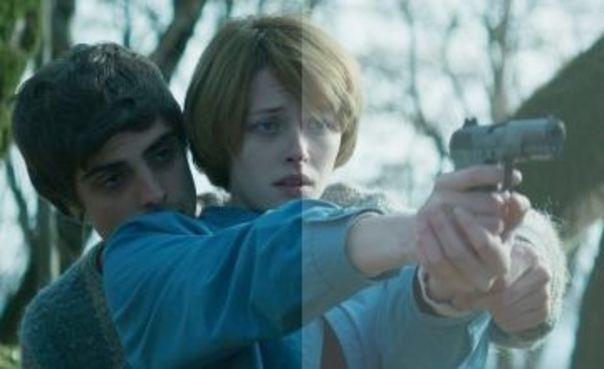Review: HOSTAGES / MDZEVLEBI
By Aslı Ildır

“No amount of freedom equals a human’s life”, tells Anna in tears during her defense in court, “I don’t know what else to say.” HOSTAGES / MDZEVLEBI (2017), a Georgian real-life hijacking thriller from the main competition of the Sarajevo Film Festival, tells the story of Anna and her friends in 1983 Soviet Georgia, trying to escape to an imagined “West” by hijacking a plane. Freedom, as a popular word to be contemplated on – especially in Cold War films – is only articulated once in the movie by Anna, as if proving the intangible and incomprehensible nature of the word itself. The non-verbal narration of the film unfolds with a non-didactic and multi-perspective tone achieved by well-managed dynamic camera movements and skilfully designed mise-en-scène choices combining interiors and exteriors.
The movie opens with a sequence showing photos of its characters shot by the police after having been arrested, a TV reporter speaking in the background, telling that they were young people who had everything but had committed a horrible crime. After the static shots showing the characters in a desperate way, which is the way the media saw them, a sequence at the seaside in Batumi introduces them in a nostalgic way with pale color palette: a group of young people laughing, swimming, having fun, and filming themselves with a hand-held camera. The film masterfully uses these intermediary mediums (photos and television) as a way to construct its characters from multiple perspectives: the media, the government, their families, their friends, and the contemporary audience looking at the past. Interestingly, the young director also tells a past he never experienced but has to deal with the memory of it. The police photos and these nostalgic 16mm films are juxtaposed: static black-and-white photos versus nostalgic colors and textures, the before and after of the escape attempt, the private and the public. These contrasts also have an ironic effect in the way that the group wanted to leave Soviet Georgia for the exact opposite, and the escape attempt was the last step that had to be taken, which resulted in a tragedy. The film uses its intermediary media as also in a self-reflexive manner. Despite the nostalgic and, in a way, aestheticized vision or memory of the past, it is aware of the fact that memories can never be objective. Therefore, we also know that while they were shooting these films, they were watched and intervened by the Soviet soldiers behind them.
There is always a risk in using the thriller genre for politically sensitive subjects, which is carefully avoided in HOSTAGES. Because it uses the thriller to recreate a traumatic situation for both the victims in the plane and also for the perpetrators with multiple perspectives (families, friends, the police, the public) and adds a political framework to subvert the victim-perpetrator discourse. However, on the contrary of what one would expect, the hijacking sequence is situated just in the middle of the movie. The first part is dedicated to the decision process. In fact, there is not a decision being made in whole movie, but there is only indecision. Being in limbo, living in the polarized era of the Iron Curtain and getting used to a world imagined in dichotomies, these characters are not able to decide. This indecisiveness is especially shown in the prolonged sequence after they take hostages in the plane and the government intervenes. Both the victims and perpetrators are wounded, traumatized, and almost paralyzed. Everyone is sitting in their places, it is almost dead silent except for some moaning. The “real action” is outside, where the government and the police are working hard to solve the situation. We even have difficulties to understand who is dead, who is wounded, and what is happening; there is pure chaos.
This may be one of the few hijacking thrillers that makes the audience empathize with both the victims and the perpetrators. Contrary to the world of dichotomies in the Cold War era, HOSTAGES manages to construct its basic conflict on the indecisiveness of its characters. It refuses to explain or show the motives of its characters for their actions, and avoids verbal political discussions between them. The words belong to the world of authorities in this film, in TV, in government offices, in radio, in newspapers… The audience never hears their thoughts, but only hears ideological interpretations from secondary sources and mediums. Starting and ending with the images of its characters swimming and laughing, it intentionally keeps their motives simple, just like Anna’s defense using a single sentence on freedom. As the ending scene depicts in the portrayal of the parents still looking for their children’s graves years after, the collective or the individual memory can never bring all the pieces together. HOSTAGES, as a film that is aware of the subjectivity of memory and history, masterfully uses different means to reflect the discrepancies, the multiple perspectives, and the process of the manipulation of the collective memory by the state and the media. One can say that it produces its own time-image.

